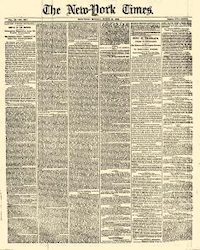BALTIMORE UNION CONVENTION.; A PLATFORM ADOPTED.
Hon. John Bell, of Tennessee, Nominated for President.
Hon. Edward Everett, of Massachusetts, for Vice-President.
Entire Harmony and Unbounded Enthusiasm.
From the Associated Press.
AFTERNOON SESSION.
The New York Times, May 11, 1860
Special Dispatch to the New-York Times.
BALTIMORE, Thursday, May 10.
Before the Convention assembled this morning circulars and handbills were liberally circulated through the Hall, setting forth the availability of Gen. HOUSTON for the Presidency, with EDWARD EVERETT for Vice-President. Though the current had, during the night, set strongly against HOUSTON, his supporters had been very busy. It was understood that a damaging break had been made against HOUSTON in the New-York delegation, and that BELL would receive ten to fifteen votes from that state.
All the States but Michigan, New-Hampshire, California, Oregon and Wisconsin responded in the Convention this morning at roll-call.
JOSEPH R. INGERSOLL, of Pennsylvania, from the Business Committee, reported the following Platform:
Whereas, Experience has demonstrated that Platforms adopted by the partisan Conventions of the country have had the effect to mislead and deceive the people, and at the same time to widen the political divisions of the country, by the creation and encouragement of geographical and sectional parties’ therefore,
Resolved, That it is both the part of patriotism and of duty to recognize no political principles other than the Constitution of the country, the Union of the States, and the enforcement of the laws; and, as the representatives of the Constitutional Union men of the country, in National Convention assembled, we here pledge ourselves to maintain, protect and defend, separately and unitedly, these great principles of public liberty and national safety, against all enemies at home and abroad; believing thereby that peace may at once be restored to the country, the just rights of the people and of the States be established, and the Government again placed in that condition of justice, fraternity, and equality which, under the example and Constitution of our fathers, has solemnly bound every citizen of the United States to maintain a more perfect union, establish justice, and secure domestic tranquillity; provide for the common defence; promote the general welfare, and secure the blessings of liberty to ourselves and our posterity.
The platform was adopted without dissent, amid great cheering.
After much debate, each State was allowed to cast the number of its electoral vote; every delegate to vote for himself.
The Convention then proceeded to ballot for a Candidate for the Presidency.
The first ballot indicated beyond question that Hon. JOHN BELL was the preference of a majority of the Convention; an indication confirmed by the second ballot when Mr. BELL had 138 votes, Gen. HOUSTON 69, and the remainder scattering. One by one the delegations from various States commenced changing their votes to BELL, and finally, speaking for a large majority of the New-York delegation, Mr. ERASTUS BROOKS proposed that the nomination of Mr. BELL be made unanimous.
The motion was carried with exalted enthusiasm, and Mr. BELL was declared to be the candidate.
The first ballot for Vice-President, resulted in the selection of Hon. EDWARD EVERETT.
The hidden break-down of the Houston interest, and the nomination of BELL, is a sore thing to many of the New York Delegates. Nearly a dozen of them refused to make the choice unanimous. It is believed to be the only sore spot in the Convention. The Southern Delegates generally are much elated, and say that he will carry Tennessee, Maryland and North Carolina any way, and, with two Democrats running, a majority of the Southern States. The Democratic Party in the South is said to be in a more broken condition than in the North. That the election will be carried into the House is confidently predicted. The proceedings attending the nomination of EVERETT were a love feast, which healed all differences. The unmixed Whig character of the ticket does not escape remark. An occasional Democrat suspects that this is little less than a Whig Convention. Nevertheless it is the general belief in and out of the Convention that it is the strongest that could have been made. The Kentucky Delegates express great satisfaction, as do the supporters of Gen. Houston generally, with the election of Mr. EVERETT. A dispatch from New-Orleans, received in the Convention, pledges Louisiana for the ticket.
The New-England delegates are much elated. The Editor of the Boston Courier at once telegraphed to have the ticket run up at the head of its columns.
There is no doubt that, if he would have consented Mr. CRITTENDEN would have been nominated, instead of Mr. BELL.
Gen. HOUSTON will remain the candidate in Texas.
It is believed that there will be no third Electoral Ticket run in New-York, but that the Union men of that State will be left to decide between the Democratic and Republican tickets.
Gov. HUNT, in declining the nomination for Vice-President, stated that he would allow nothing to interfere with his purpose to act independently and effectually in his State. The remark was regarded as significant.
The speeches of Maj. HENRY, of Tennessee, and Mr. HILLARD, of Massachusetts, were efforts of great eloquence.

I can see from this article, that reporting on politics is very much the same as today.
I would have like to time travel back to this time to see and watch the people. I have been studying this era of American history for more than 20 years and it is the most interesting time of America for me.
Yes, it was an interesting time…, and much more tragic for amny than our own.